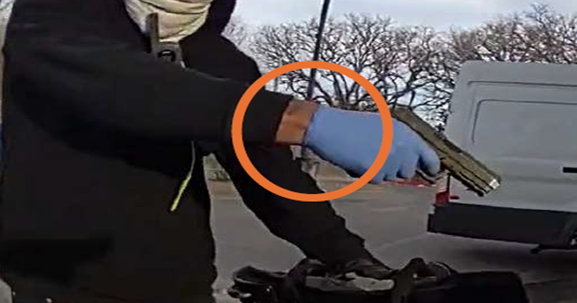Boy Scouts Release 20 Years Of 'Perversion' Files
TRENTON, N.J. (CBSNewYork/AP) -- An array of local authorities -- police chiefs, prosecutors, pastors and town Boy Scout leaders among them -- quietly shielded scoutmasters and others who allegedly molested children, according to a newly opened trove of confidential files compiled from 1959 to1985.
At the time, those authorities justified their actions as necessary to protect the good name and good works of Scouting. But as detailed in 14,500 pages of secret "perversion files'' released Thursday by order of the Oregon Supreme Court, their maneuvers protected suspected sexual predators while victims suffered in silence.
The files document sex abuse allegations across the country, from a small town in the Adirondacks to downtown Los Angeles.
More than 100 former Scout leaders from New Jersey are included in the so-called perversion files.
1010 WINS' Steve Sandberg reports
Podcast
A Trenton man claims he suffered years of sexual abuse at the hands of his troop chaplain Father Robert Becker in the 1980s, beginning when he was 11-years-old.
The former Boy Scout, who is now 43, said Becker threatened him to keep quiet.
"If I didn't allow him to do certain things I would not be able to be in the Scout troop," Stacy, who did not want his last named used, said.
He is accusing the organization of engaging in a cover-up by putting Becker on the so-called perversion files and keeping it secret for decades.
"It's beyond a cover-up; it's decades of untruth," Stacy said. "You say that you're friends to the youth, you're not, you're as bad as the one that did the perpetrating of it."
"It angers me that the Boy Scouts knew," he added. "To know that they knew it upset me even greater...they had him on the list. I'm angered by it."
Becker faced several criminal charges but died before trial, 1010 WINS' Steve Sandberg reported.
At a news conference Thursday, Portland attorney Kelly Clark blasted the Boy Scouts for their continuing legal battles to try to keep the full trove of files secret.
"You do not keep secrets hidden about dangers to children,'' said Clark, who in 2010 won a landmark lawsuit against the Boy Scouts on behalf of a plaintiff who was molested by an assistant scoutmaster in the 1980s.
The files were shown to a jury in a 2010 Oregon civil suit that the Scouts lost, and the Oregon Supreme Court ruled the files should be made public. After months of objections and redactions, the Scouts and Clark released them.
Attorney Kevin Mulhearn represents 12 men who claim they were sexually abused by Scout leaders at Poly Prep in Brooklyn.
"This institution thinks that it's in their own self-interest to protect themselves and their institutions and their organizations rather than the kids," Mulhearn told WCBS 880's Peter Haskell.
WCBS 880's Peter Haskell reports
Podcast
Mulhearn said even though the accusations were made decades ago, the Boy Scouts could still face massive liability and civil suits.
"If they knew and they covered it up, it's time to pay the piper," Mulhearn said.
Even with the statute of limitations on criminal charges, Mulhearn said he still urges victims to come forward.
"If somebody starts abusing children in their adulthood, it's very unlikely that they're going to stop," the attorney said. "Harming a child in this way is the most despicable thing you can do."
The Associated Press obtained copies of the files weeks ahead of Thursday's release, and conducted an extensive review of them.
The newly released files are a window on a much larger collection of documents the Boy Scouts of America began collecting soon after their founding in 1910. The files, kept at Boy Scout headquarters in Texas, consist of memos from local and national Scout executives, handwritten letters from victims and their parents and newspaper clippings about legal cases. The files contain details about proven molesters, but also unsubstantiated allegations.
Many of the files released on Thursday have been written about before, but this is the first time the earliest ones have been put in the public domain.
The 1959-85 files show that on many occasions the files succeeded in keeping pedophiles out of Scouting leadership positions -- the reason they were collected in the first place.
But the files document some troubling patterns.
In many instances -- more than a third, according to the Scouts' own count -- police weren't told about the alleged abuse.
And there is little mention in the files of concern for the welfare of Scouts who were allegedly abused by their leaders. But there are numerous documents showing compassion for suspected abusers, who were often times sent to psychiatrists or pastors to get help.
In 1972, a Pennsylvania Scouting executive wrote a memo recommending a case against a suspected abuser be dropped with the words: "If it don't stink, don't stir it.''
In numerous instances, alleged abusers are kicked out of Scouting but show up in jobs where they are once again in authority positions dealing with youths.
One of the most startling revelations to come from the files is the frequency with which attempts to protect Scouts from alleged molesters collapsed at the local level, at times in collusion with community leaders.
On the afternoon of Aug. 10, 1965, a distraught Louisiana mother walked into the Ouachita Parish Sheriff's Office. A 31-year-old scoutmaster, she told the chief criminal deputy, had raped one of her sons and molested two others.
Six days later, the scoutmaster sat down in the same station and confessed.
"I don't know an explanation, why we done it or I done it or wanted to do it or anything else it just -- an impulse I guess or something,'' the man told a sheriff's deputy.
The decision was made not to pursue charges. "This subject and Scouts were not prosecuted,'' a Louisiana Scouts executive wrote to national headquarters, "to save the name of Scouting.''
The Scouts in late September made public an internal review of the files and said they would look into past cases to see whether there were times when abusers should have been reported to police.
The files showed a "very low'' incidence of abuse among Scout leaders, said psychiatrist Dr. Jennifer Warren, who conducted the review with a team of graduate students and served as an expert witness for the Scouts in the 2010 case that made the files public. Her review of the files didn't take into account the number of files destroyed on abusers who turned 75 years old or died, something she said would not have significantly affected the rate of abuse or her conclusions.
The rate of abuse among Scouts is the not the focus of their critics -- it is, rather, their response to allegations of abuse.
Throughout the files released Thursday are cases in which steps were taken to protect Scouting's image.
In Newton, Kan., in 1961, the county attorney had what he needed for a prosecution: Two men were arrested and admitted that they had molested Scouts in their care. But neither man was prosecuted.
The entire investigation, the county attorney wrote, was brought about with the cooperation of a local district Scouts executive, who was kept apprised of the investigation's progress into the men, who had affiliations with both the Scouts and the local YMCA.
"I came to the decision that to openly prosecute would cause great harm to the reputations of two organizations which we have involved here -- the Boy Scouts of America and the local YMCA,'' he wrote in a letter to a Kansas Scouting executive.
In Johnstown, Pa., in August 1962, a married 25-year-old steel mill worker with a high school education pleaded guilty to "serious morals'' violations involving Scouts.
The Scouting executive who served as both mayor and police chief made sure of one thing: The Scouting name was never brought up. It went beyond the mayor to the members of a three-judge panel, who also deemed it important to keep the Scouts' names out of the press.
"No mention of Scouting was involved in the case in as much as two of the three judges who pronounced sentence are members of our Executive Board,'' the Scouts executive wrote to the national personnel division.
(TM and Copyright 2012 CBS Radio Inc. and its relevant subsidiaries. CBS RADIO and EYE Logo TM and Copyright 2012 CBS Broadcasting Inc. Used under license. All Rights Reserved. This material may not be published, broadcast, rewritten, or redistributed. The Associated Press contributed to this report.)






